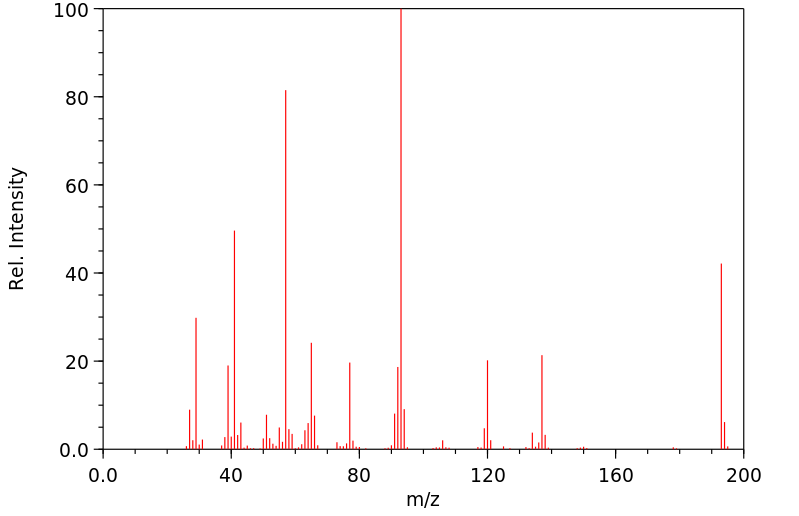2-甲基丙基N-苯基氨基甲酸酯 | 2291-80-7
中文名称
2-甲基丙基N-苯基氨基甲酸酯
中文别名
——
英文名称
iso-butyl N-phenylcarbamate
英文别名
iso-butyl phenylcarbamate;Carbanilsaeure-isobutylester;Isobutyl-N-phenylcarbamat;Isobutyl phenylcarbamate;2-methylpropyl N-phenylcarbamate
CAS
2291-80-7
化学式
C11H15NO2
mdl
MFCD00775708
分子量
193.246
InChiKey
ULLHJKVIRXQCJN-UHFFFAOYSA-N
BEILSTEIN
——
EINECS
——
-
物化性质
-
计算性质
-
ADMET
-
安全信息
-
SDS
-
制备方法与用途
-
上下游信息
-
文献信息
-
表征谱图
-
同类化合物
-
相关功能分类
-
相关结构分类
物化性质
-
熔点:86°C
-
沸点:329.46°C (rough estimate)
-
密度:1.0945 (rough estimate)
-
保留指数:1552
计算性质
-
辛醇/水分配系数(LogP):3.3
-
重原子数:14
-
可旋转键数:4
-
环数:1.0
-
sp3杂化的碳原子比例:0.363
-
拓扑面积:38.3
-
氢给体数:1
-
氢受体数:2
SDS
上下游信息
-
上游原料
中文名称 英文名称 CAS号 化学式 分子量 N-Boc-苯胺 tert-butyl phenylcarbamate 3422-01-3 C11H15NO2 193.246
反应信息
-
作为反应物:描述:2-甲基丙基N-苯基氨基甲酸酯 在 lithium aluminium deuteride 作用下, 以 四氢呋喃 为溶剂, 以411 mg的产率得到N-(methyl-d3)aniline参考文献:名称:与叔丁基过氧化氢的氧化曼尼希反应的机理研究。过渡金属盐的作用摘要:提出了过渡金属催化 N,N-二烷基苯胺与叔丁基过氧化氢 (TBHP) 作为氧化剂的氧化曼尼希反应的一般机制。该机制包括从 4-甲氧基到 4-氰基-N,N-二甲基苯胺均匀的限速单电子转移 (SET)。叔丁基过氧自由基是决定速率的 SET 步骤中的主要氧化剂,随后是竞争性向后 SET 和 α 位碳氢键的不可逆异裂裂解为氮。第二个 SET 完成 N,N-二甲基苯胺向亚胺离子的转化,亚胺离子随后在形成曼尼希加合物之前被亲核溶剂或氧化剂捕获。Rh(2)(cap)(4)、RuCl(2)(PPh(3))(3)、CuBr、FeCl(3) 和 Co(OAc)(2) 在 N 中的一般作用,T-HYDRO 氧化 N-二烷基苯胺是为了启动 TBHP 向叔丁基过氧自由基的转化。第二种途径涉及 O(2) 作为氧化剂,存在于铜盐、铁盐和钴盐中。讨论了线性自由能关系 (LFER) 分析、动力学和产物同位素效应(KIE 和DOI:10.1021/ja3113559
-
作为产物:参考文献:名称:由Boc保护的胺一锅合成氨基甲酸酯和硫代氨基甲酸酯摘要:已经描述了用于合成氨基甲酸酯和硫代氨基甲酸酯的高效一锅法。在2-氯吡啶和三氟甲磺酰酐的存在下,原位生成异氰酸酯中间体,用于与醇和硫醇的进一步反应,以高收率提供所需的氨基甲酸酯和硫代氨基甲酸酯。DOI:10.1016/j.tetlet.2016.09.038
-
作为试剂:描述:1,1-二苯乙烯 、 Langlois reagent 在 dipotassium peroxodisulfate 、 2-甲基丙基N-苯基氨基甲酸酯 、 4',5'-Dichlorofluorescein 作用下, 以 二甲基亚砜 为溶剂, 反应 11.0h, 以41%的产率得到(3,3,3-trifluoroprop-1-ene-1,1-diyl)dibenzene参考文献:名称:光氧化还原催化剂启用的叔丁基芳基氨基甲酸酯的对选择性三氟甲基化摘要:已经广泛研究了使用自由基途径在芳环上直接结合三氟甲基。然而,一类芳烃的直接高对位选择性 CH 三氟甲基化尚未实现。在这项研究中,我们报告了使用 Langlois 试剂对芳基氨基甲酸酯进行光促进的 4,5-二氯荧光素 (DCFS)对位选择性 C-H 三氟甲基化。初步机理研究表明,活化的有机光催化剂与芳基氨基甲酸酯配位导致对位选择性 C-H 三氟甲基化。十克规模的反应表现良好,突出了这一新协议的综合重要性。DOI:10.1002/anie.202105631
文献信息
-
Fe<sub>3</sub>O<sub>4</sub>@SiO<sub>2</sub>/Schiff base/Pd complex as an efficient heterogeneous and recyclable nanocatalyst for chemoselective N-arylation of O-alkyl primary carbamates作者:A. R. Sardarian、M. Zangiabadi、I. Dindarloo InalooDOI:10.1039/c6ra17268g日期:——
An Fe3O4@SiO2/Schiff base/Pd complex as an efficient, heterogeneous magnetically recoverable and reusable catalyst for the
N -arylation ofO -alkyl primary carbamates. -
Nickel‐Catalyzed Synthesis of <i>N</i> ‐(Hetero)aryl Carbamates from Cyanate Salts and Phenols Activated with Cyanuric Chloride作者:Iman Dindarloo Inaloo、Mohsen Esmaeilpour、Sahar Majnooni、Ali Reza OveisiDOI:10.1002/cctc.202000876日期:2020.11.5one‐pot synthesis of N‐(hetero)aryl carbamates through the reaction between alcohols and in‐situ produced (hetero)aryl isocyanates in the presence of a nickel catalyst. The phenolic C−O bond was activated via the reaction of phenol with cyanuric chloride (2,4,6‐trichloro‐1,3,5‐triazine (TCT)) as an inexpensive and readily available reagent. This strategy provides practical access to N‐(hetero)aryl carbamates
-
Direct Catalytic Synthesis of <i>N</i> ‐Arylcarbamates from CO <sub>2</sub> , Anilines and Alcohols作者:Masazumi Tamura、Ayaka Miura、Masayoshi Honda、Yu Gu、Yoshinao Nakagawa、Keiichi TomishigeDOI:10.1002/cctc.201801443日期:2018.11.7The direct catalytic synthesis of carbamates from CO2, amines and methanol was achieved by controlling both the reaction equilibrium and the reactivity of the three components. The combination of CeO2 and 2‐cyanopyridine was an effective catalyst, providing various carbamates including N‐arylcarbamates in high selectivities.
-
A Fe<sub>3</sub> O<sub>4</sub> @SiO<sub>2</sub> /Schiff Base/Pd Complex as an Efficient Heterogeneous and Recyclable Nanocatalyst for One-Pot Domino Synthesis of Carbamates and Unsymmetrical Ureas作者:Iman Dindarloo Inaloo、Sahar MajnooniDOI:10.1002/ejoc.201901140日期:2019.10.9A palladium‐catalyzed domino method for the direct synthesis of carbamates and ureas has been developed by using readily available and economical starting materials (aryl halide, carbon monoxide, sodium azide, amines, and alcohols) in a one‐pot approach. This efficient and phosgene‐free process provided an inexpensive and attractive route to synthesize the products in good to excellent yields.
-
A Synthetic Approach to <i>N</i>-Aryl Carbamates via Copper-Catalyzed Chan–Lam Coupling at Room Temperature作者:Soo-Yeon Moon、U. Bin Kim、Dan-Bi Sung、Won-Suk KimDOI:10.1021/jo502828r日期:2015.2.6catalyst. The reaction proceeds readily in an open flask at room temperature without additional base, ligand, or additive. Rapid access to urea analogues via a two-step one-pot procedure is enabled by reacting N-arylcarbamates with aluminum–amine complexes. In addition, among several boronic acid derivatives prepared, dimethylphenyl boronate was found to react rapidly in its reaction with benzyl azidoformate
表征谱图
-
氢谱1HNMR
-
质谱MS
-
碳谱13CNMR
-
红外IR
-
拉曼Raman
-
峰位数据
-
峰位匹配
-
表征信息
同类化合物
(βS)-β-氨基-4-(4-羟基苯氧基)-3,5-二碘苯甲丙醇
(S,S)-邻甲苯基-DIPAMP
(S)-(-)-7'-〔4(S)-(苄基)恶唑-2-基]-7-二(3,5-二-叔丁基苯基)膦基-2,2',3,3'-四氢-1,1-螺二氢茚
(S)-盐酸沙丁胺醇
(S)-3-(叔丁基)-4-(2,6-二甲氧基苯基)-2,3-二氢苯并[d][1,3]氧磷杂环戊二烯
(S)-2,2'-双[双(3,5-三氟甲基苯基)膦基]-4,4',6,6'-四甲氧基联苯
(S)-1-[3,5-双(三氟甲基)苯基]-3-[1-(二甲基氨基)-3-甲基丁烷-2-基]硫脲
(R)富马酸托特罗定
(R)-(-)-盐酸尼古地平
(R)-(-)-4,12-双(二苯基膦基)[2.2]对环芳烷(1,5环辛二烯)铑(I)四氟硼酸盐
(R)-(+)-7-双(3,5-二叔丁基苯基)膦基7''-[((6-甲基吡啶-2-基甲基)氨基]-2,2'',3,3''-四氢-1,1''-螺双茚满
(R)-(+)-7-双(3,5-二叔丁基苯基)膦基7''-[(4-叔丁基吡啶-2-基甲基)氨基]-2,2'',3,3''-四氢-1,1''-螺双茚满
(R)-(+)-7-双(3,5-二叔丁基苯基)膦基7''-[(3-甲基吡啶-2-基甲基)氨基]-2,2'',3,3''-四氢-1,1''-螺双茚满
(R)-(+)-4,7-双(3,5-二-叔丁基苯基)膦基-7“-[(吡啶-2-基甲基)氨基]-2,2”,3,3'-四氢1,1'-螺二茚满
(R)-3-(叔丁基)-4-(2,6-二苯氧基苯基)-2,3-二氢苯并[d][1,3]氧杂磷杂环戊烯
(R)-2-[((二苯基膦基)甲基]吡咯烷
(R)-1-[3,5-双(三氟甲基)苯基]-3-[1-(二甲基氨基)-3-甲基丁烷-2-基]硫脲
(N-(4-甲氧基苯基)-N-甲基-3-(1-哌啶基)丙-2-烯酰胺)
(5-溴-2-羟基苯基)-4-氯苯甲酮
(5-溴-2-氯苯基)(4-羟基苯基)甲酮
(5-氧代-3-苯基-2,5-二氢-1,2,3,4-oxatriazol-3-鎓)
(4S,5R)-4-甲基-5-苯基-1,2,3-氧代噻唑烷-2,2-二氧化物-3-羧酸叔丁酯
(4S,4''S)-2,2''-亚环戊基双[4,5-二氢-4-(苯甲基)恶唑]
(4-溴苯基)-[2-氟-4-[6-[甲基(丙-2-烯基)氨基]己氧基]苯基]甲酮
(4-丁氧基苯甲基)三苯基溴化磷
(3aR,8aR)-(-)-4,4,8,8-四(3,5-二甲基苯基)四氢-2,2-二甲基-6-苯基-1,3-二氧戊环[4,5-e]二恶唑磷
(3aR,6aS)-5-氧代六氢环戊基[c]吡咯-2(1H)-羧酸酯
(2Z)-3-[[(4-氯苯基)氨基]-2-氰基丙烯酸乙酯
(2S,3S,5S)-5-(叔丁氧基甲酰氨基)-2-(N-5-噻唑基-甲氧羰基)氨基-1,6-二苯基-3-羟基己烷
(2S,2''S,3S,3''S)-3,3''-二叔丁基-4,4''-双(2,6-二甲氧基苯基)-2,2'',3,3''-四氢-2,2''-联苯并[d][1,3]氧杂磷杂戊环
(2S)-(-)-2-{[[[[3,5-双(氟代甲基)苯基]氨基]硫代甲基]氨基}-N-(二苯基甲基)-N,3,3-三甲基丁酰胺
(2S)-2-[[[[[((1S,2S)-2-氨基环己基]氨基]硫代甲基]氨基]-N-(二苯甲基)-N,3,3-三甲基丁酰胺
(2S)-2-[[[[[[((1R,2R)-2-氨基环己基]氨基]硫代甲基]氨基]-N-(二苯甲基)-N,3,3-三甲基丁酰胺
(2-硝基苯基)磷酸三酰胺
(2,6-二氯苯基)乙酰氯
(2,3-二甲氧基-5-甲基苯基)硼酸
(1S,2S,3S,5S)-5-叠氮基-3-(苯基甲氧基)-2-[(苯基甲氧基)甲基]环戊醇
(1S,2S,3R,5R)-2-(苄氧基)甲基-6-氧杂双环[3.1.0]己-3-醇
(1-(4-氟苯基)环丙基)甲胺盐酸盐
(1-(3-溴苯基)环丁基)甲胺盐酸盐
(1-(2-氯苯基)环丁基)甲胺盐酸盐
(1-(2-氟苯基)环丙基)甲胺盐酸盐
(1-(2,6-二氟苯基)环丙基)甲胺盐酸盐
(-)-去甲基西布曲明
龙蒿油
龙胆酸钠
龙胆酸叔丁酯
龙胆酸
龙胆紫-d6
龙胆紫








